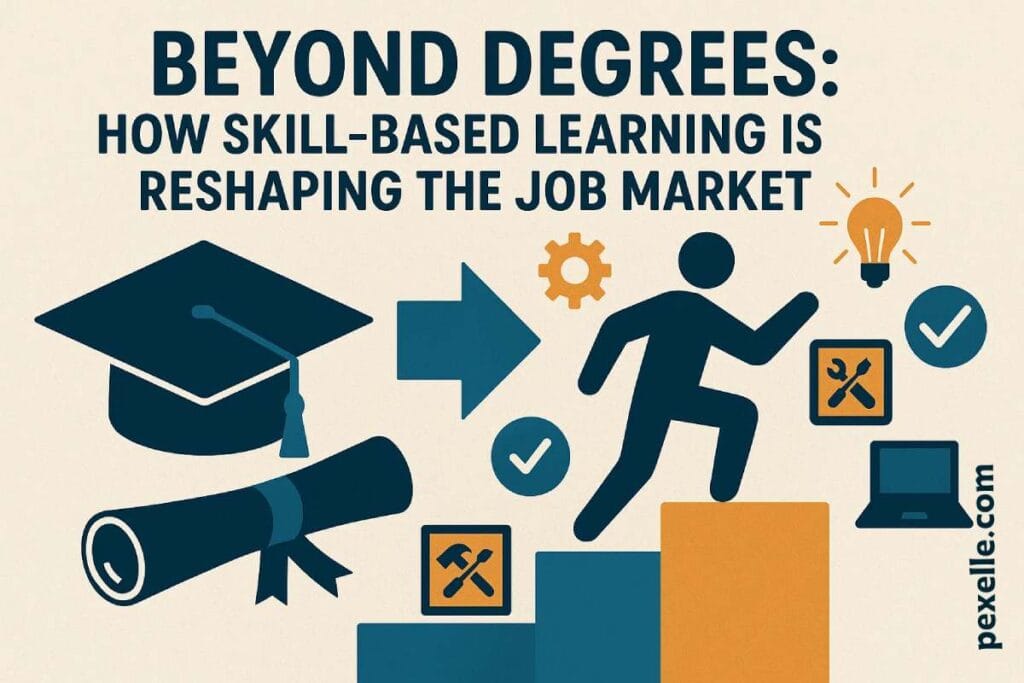Beyond Degrees: How Skill-Based Learning is Reshaping the Job Market

Introduction: A Shift in the Education-to-Work Paradigm
For decades, a college degree was considered the golden ticket to a successful career. Employers used it as a proxy for competence, and job seekers invested years of study and significant financial resources to obtain it. But the job market of today tells a different story. With rapid technological advancements, evolving industries, and global competition, employers are increasingly prioritizing skills over academic credentials.
This shift is redefining the traditional education-to-work pipeline, paving the way for skill-based learning platforms like Pexelle to play a crucial role in preparing the workforce of the future.
The Drivers Behind the Shift to Skill-Based Learning
Several factors are accelerating the move away from degree-centric hiring toward competency-driven career pathways:
- Technological Disruption – Emerging technologies like AI, automation, and blockchain are creating jobs that didn’t exist a decade ago, demanding skills traditional institutions often fail to teach quickly enough.
- Global Talent Competition – Remote work has expanded the talent pool, enabling companies to hire skilled professionals worldwide regardless of their academic backgrounds.
- The Skills Gap Crisis – According to the World Economic Forum, by 2030, over 1 billion people will need reskilling due to automation and digitization, creating demand for continuous, modular learning rather than one-time degrees.
- Employer Demand for Agility – Companies now value micro-credentials, certifications, and project-based experience that can be updated in real time to reflect current industry needs.
The Rise of Skill-Based Learning Platforms
Skill-based learning platforms like Pexelle are transforming education by:
- Personalizing Learning Paths: AI-driven systems analyze a learner’s existing competencies and career goals, recommending courses and certifications tailored to their aspirations.
- Connecting Skills to Jobs: Instead of generic education, learners receive direct alignment with job requirements, bridging the gap between training and employment.
- Modular & Flexible Learning: Micro-courses, short-term bootcamps, and project-based assignments allow learners to upskill while working full-time.
- Global Accessibility: Online delivery ensures that anyone, anywhere, can access world-class training without relocating or paying exorbitant tuition fees.
For example, a marketing graduate aiming to specialize in digital analytics could follow a custom AI-generated path: SEO fundamentals → Google Analytics certification → Data visualization in Python → Real-world capstone projects.
The Impact on Employers and Job Seekers
Employers benefit by hiring candidates with proven skills demonstrated through portfolios, certifications, and hands-on projects rather than theoretical knowledge. This leads to:
- Faster onboarding times
- Reduced training costs
- Better alignment between job roles and candidate capabilities
Job seekers gain more career mobility, as skill-based credentials are stackable and transferable across industries. A software engineer, for instance, could transition into cybersecurity or AI development through targeted skill programs instead of pursuing another expensive degree.
Challenges in Scaling Skill-Based Learning
Despite its advantages, the skill-based learning model faces challenges:
- Recognition by Employers: Some organizations still cling to degree-based hiring standards.
- Quality Assurance: With the rise of online certifications, ensuring credibility and standardization becomes critical.
- Access & Equity: Affordable internet and digital literacy remain barriers in developing regions.
Overcoming these hurdles requires collaboration between governments, educational institutions, and platforms like Pexelle to establish standards, subsidies, and scalable solutions.
The Future of Careers: Skills as the New Currency
As industries evolve, lifelong learning will become the norm rather than the exception. Traditional degrees will no longer guarantee career security. Instead, skills will serve as the new currency in the job market, allowing professionals to pivot, adapt, and stay relevant in a rapidly changing world.
Platforms like Pexelle are at the forefront of this transformation, ensuring that learning paths are data-driven, personalized, and directly tied to employability.
Conclusion: A World Beyond Degrees
The global workforce is entering an era where skills, not diplomas, define career success. Employers want proof of capability, not just proof of education. Skill-based learning offers the agility, accessibility, and relevance needed to thrive in the 21st-century economy.
As the trend accelerates, platforms that can bridge the gap between learning and employment—like Pexelle—will be instrumental in shaping a future where education truly meets the demands of the job market.
Source : Medium.com




